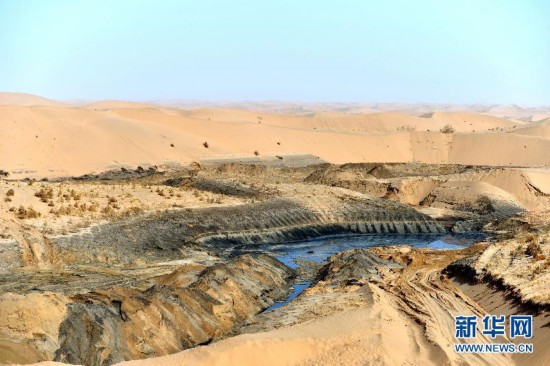Desert pollution probe under new environmental law
 0 Comment(s)
0 Comment(s) Print
Print E-mail CRI, April 15, 2015
E-mail CRI, April 15, 2015
A major industrial player in the northwest Chinese province of Gansu has had its operations suspended and fined some 48-million US dollars for illegally discharging waste water into Tennger Desert.
 |
|
A company in Gansu Province discharged more than 83,000 metric tons of untreated water in the desert through a concealed conduit between May 28, 2014, and March 6. [File photo/Xinhua] |
In March, Gansu government conducted what it calls "a thorough inspection" of local enterprises, looking for illegal discharging in the desert.
The snap inspection failed to expose any illegal activities.
However, media reports then followed and exposed that a company called Ronghua Industry & Trade had been discharging waste water into the Tengger Desert.
This has raised questions about how the local industrial giant in Gansu was able to bypass inspections and discharge waste water into the desert.
Ma Jun is the director of the China Institute of Public and Environmental Affairs.
"In many cases, local environmental bureaus aren't able to withstand pressure from economic interests. Instead, they simply submit to the decision-making of local governments, who often prioritize economic interests over the environment. This happens a lot in the western regions, where economic growth is still lagging behind."
Gansu's provincial authorities have since admitted they have loopholes in its supervision, pinning the blame on the municipal government of the city of Wuwei for deliberately concealing the facts of the case.
Officials with local environmental protection departments are now under investigation.
Taking effect this year, China's revised environmental protection law includes stronger penalties for firms breaking the rules, as well as more accountability for local governments.
But observers say the core of the issues lies in how the law is applied.






Go to Forum >>0 Comment(s)